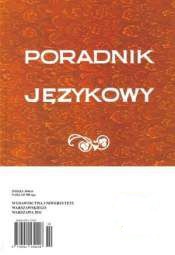PALEOSEMANTYZMY W ZWIąZKACH FRAZEOLOGICZNYCH
Paleosemantisms in Phrasal Collocations
Author(s): Agnieszka JawórSubject(s): Language and Literature Studies
Published by: Dom Wydawniczy ELIPSA
Keywords: paleosemantyzmy; paleosemantyzm; związki frazeologiczne; paleosemantisms; Phrasal Collocations; frazeologia; polszczyzna;
Summary/Abstract: In contemporary Polish there are collocations which save not only archaic inflectional forms, e.g.: przed dawnymi laty (long ago), mówiąc innymi słowy (in other words), za pan brat (knowing only too well), wyjść za mąż (to marry sb), or lexical ones, e.g.: po omacku (not seeing); bez liku (countless); po próżnicy (in vain), but they also restore ancient meanings of words, e.g.: błędny rycerz (lost knight), chodzić jak błędna owca (walk like a lost sheep); słomiany wdowiec (temporary widower), słomiana wdowa (temporary widow) etc. It is about paleosemantisms, i.e. words used today in a different meaning. Collocations with paleosemantisms get out of use the fastest as they might be wrongly interpreted and cause misunderstandings. It is an outcome of linguistic defense mechanism. Yet, in contemporary Polish, there is linguistic evidence of stabilization of collocations whose lexeme-component meanings have passed away. What makes some lexical units of the kind disappear and others stay within the language? Are there any semantic clashes? Are the phrases containing words with misleading associations really wrongly interpreted? How does language cope with such collocations? These are the main questions raised in the article.
Journal: Poradnik Językowy
- Issue Year: 2009
- Issue No: 04
- Page Range: 65-74
- Page Count: 10
- Language: Polish
- Content File-PDF

